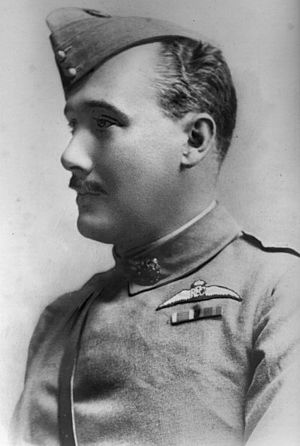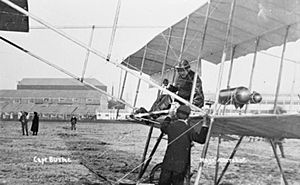Charles Burke (British Army officer) facts for kids
Quick facts for kids
Charles Burke
|
|
|---|---|

Burke in the uniform of the Royal Flying Corps
|
|
| Nickname(s) | Pregnant Percy |
| Born | 9 March 1882 Armagh, Ireland |
| Died | 9 April 1917 (aged 35) Near Arras, France |
| Allegiance | United Kingdom |
| Service/ |
British Army |
| Rank | Lieutenant Colonel |
| Unit | Royal Irish Regiment Royal Flying Corps |
| Commands held | Second Wing No. 2 Squadron RFC |
| Battles/wars | Second Boer War First World War |
| Awards | Distinguished Service Order |
Lieutenant Colonel Charles James Burke DSO (born March 9, 1882 – died April 9, 1917) was a brave officer. He served in the Royal Irish Regiment and the Royal Flying Corps. He was also a pioneer in military aviation, meaning he was one of the first to explore using airplanes in the army.
Charles Burke was the youngest son of Michael Charles Christopher Burke. His family lived at Ballinhone House in Armagh, Ireland.
Contents
Charles Burke's Military Journey
Charles Burke started his army career in a group called the 3rd (Militia) battalion of the Royal Dublin Fusiliers. A Militia was a group of citizens trained as soldiers, ready to help if needed. He became a lieutenant in October 1900.
He fought in the Second Boer War in South Africa. For his service, he received the Queen's medal. After the war ended in 1902, he joined the regular army. He became a second-lieutenant in the Royal Irish Regiment.
After several years, he was promoted to captain in September 1909. The next year, Burke went to France to learn how to fly. He learned to fly a Farman biplane and earned his pilot's license.
Early Flying Adventures
When Burke returned to England, he worked at the Army's Balloon School. In early 1911, he helped test new aircraft. On January 7, 1911, Burke flew a Farman plane for two miles. He flew at about 50 to 80 feet high and landed safely.
A few minutes later, he tried a second flight. But after only 50 yards, the plane lost power and crashed. Burke was injured in the accident. Even after this crash, Burke was not afraid to keep flying. Later that year, he made several long flights.
Thinking About Air Power
Burke was one of the first British Army officers to think deeply about how airplanes could be used in war. In 1911, he wrote an article about "air power." This article was published in a military journal.
In his article, Burke compared how cavalry (soldiers on horseback) gather information to how aircraft could do the same. He also thought that just as cavalry might fight each other, so could airplanes.
Burke's Flying Rules
In 1912, Burke wrote 29 important rules for flying. These rules showed how much he understood about aviation and pilots. Here are some of them:
- Only spending time flying will make someone a good pilot.
- When training pilots, each flight should have a clear goal.
- People on the ground often think they are better at flying than they really are.
- Young pilots should not fly in "bumpy" weather until they have flown for 15 hours.
- A plane can fly in the wind, like a lifeboat can handle any sea. But both need skilled people in charge.
- Every crash makes pilots a little less brave and eager.
- A pilot who is stiff while flying should relax or stop flying.
- Napoleon said that in war, the mental part is three times more important than the physical part. Burke said if Napoleon knew about aviation, he would add a zero to the three!
- If a passenger doesn't trust the pilot, there might be trouble. If the pilot doesn't trust himself, there will definitely be trouble.
- Just because something has been done safely ten times doesn't mean it will be safe on the eleventh try.
- Pilots need confidence, observers need to be truthful, and mechanics need to be reliable.
- Rumors are common in aviation.
- Pilots should not listen to jealous comments from others.
- Seeing others fly makes you realize the weather isn't as bad as you thought.
- Pilots should be grouped by skill. The weather will be good for all of one group or none.
- How much flying gets done depends on how well you plan to use good weather.
- Good plans are rarely made.
- Aviation, like some medicines, should only be taken in small amounts at first.
- When things are going well, the person in charge can relax a bit.
- Nothing is ever as good or as bad as it seems.
- Waiting around at the airfield has ruined more pilots than anything else.
- Even the best pilots can get tired and become as dangerous as a beginner.
- Everyone who starts flying becomes very excited about it.
- Don't regret giving a beginner too little flying at first. But remember time lost due to poor planning.
- If you are unsure about letting beginners fly, don't let them.
- A military pilot becomes truly valuable after six months.
- In aviation, things go completely wrong or completely well. Neither should change what the person in charge plans to do.
- If you know what you want, you can do your part and get others to do theirs. Most people don't know what they want.
- A Squadron Commander should want a good Squadron, not just to break records.
On May 13, 1912, Burke became the leader of the Flying Corps' No. 2 Squadron. He was promoted to major. For the next two years, Burke trained his squadron in aerial reconnaissance. This means using planes to gather information about the enemy. In September 1912, Burke took part in army training exercises.
In February 1913, five planes from No. 2 Squadron flew a long distance north. They flew 450 miles over 13 days. They landed in Scotland, creating the first military airbase in the United Kingdom.
World War I Service
When First World War began, Burke was mentioned in a special report by Sir John French in October 1914. The next month, Burke was chosen to be the first commander of No. 2 Wing of the Royal Flying Corps. He set up his headquarters in France. His wing included two squadrons, No. 5 and No. 6.
In 1915, Burke helped recruit people for the Royal Flying Corps in Canada. He suggested that training airfields could be built in Canada. From February to June 1916, Burke was in charge of the Central Flying School, where pilots were trained.
In the summer of 1916, Burke rejoined his old regiment, the Royal Irish Regiment. They needed more officers. Charles Burke was killed in action on April 9, 1917. He was leading the 1st Battalion of the East Lancashire Regiment. It was the first day of the Battle of Arras. He was visiting a front line post when a shell hit it. Both Burke and his assistant were killed.
Lieutenant-Colonel Burke is buried at the Point-du-Jour Military Cemetery in Athies, France. His assistant is buried next to him. Charles Burke is also remembered on the Men of Thomond Memorial in Limerick City, Ireland.
Images for kids




